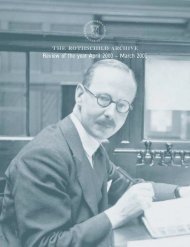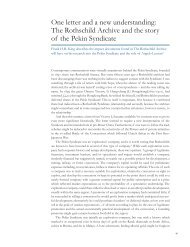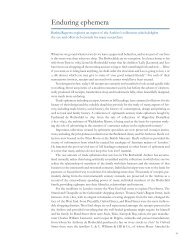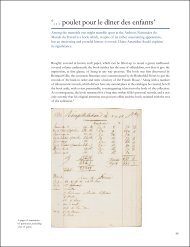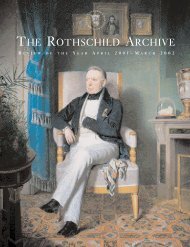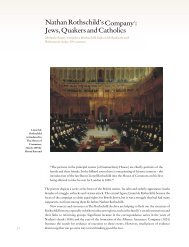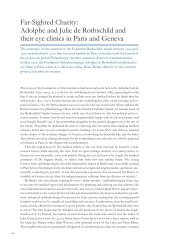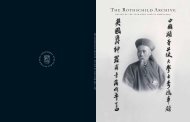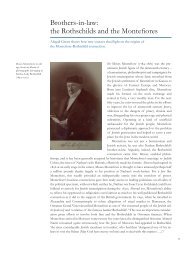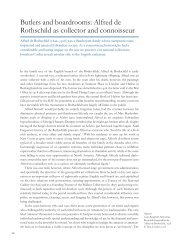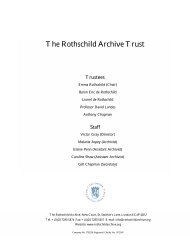66900 Rothschild Archive - The Rothschild Archive.
66900 Rothschild Archive - The Rothschild Archive.
66900 Rothschild Archive - The Rothschild Archive.
Create successful ePaper yourself
Turn your PDF publications into a flip-book with our unique Google optimized e-Paper software.
44<br />
francs’ worth of 5 per cent Piedmont stock, some 73,000 francs’ worth of 2½ per cent Dutch<br />
stock and about 14,000 francs’ worth of Spanish stock (xxiv, 383). ₁ ⁵ In 1852, following the death<br />
of his mother and his acquisition of her remaining assets, Herzen acquired further stock to a<br />
value of 60,000 francs in a new Belgian Government loan, a share worth 25,000 francs in a new<br />
loan to the City of Paris (an investment highly recommended by <strong>Rothschild</strong>) and stock worth<br />
25,000 francs in the Lyon-Avignon Railway Company. ₁₆<br />
In this fresh spell of financial activity, as previously, Herzen showed himself always willing<br />
to be guided by James de <strong>Rothschild</strong>. He could give no better proof of the high value that he<br />
placed on his advice, he told James as he was persuaded to use some of his capital to buy Ohio<br />
stock, than to follow it immediately. ₁ ⁷ His capital invariably went into projects or funds that<br />
<strong>Rothschild</strong>s were promoting. After all, the <strong>Rothschild</strong>s made large loans to the Kingdom of<br />
Piedmont-Sardinia, enjoyed pre-eminence in Spanish finance up until 1854, and aspired to control<br />
the finances of the new Belgian state, which had been created in 1831. It might therefore<br />
be said that by investing in the stock of governments that the <strong>Rothschild</strong>s supported Herzen<br />
the investor was making a personal contribution, however small, to the preservation of the<br />
stable European order which the <strong>Rothschild</strong>s, as financiers, valued and helped to maintain by<br />
means of their political influence but which Herzen, as a revolutionary, supposedly hoped to<br />
undermine. A socialist might also have been expected to baulk at an investment in Virginia, a<br />
slave-owning state of the ante-bellum southern confederacy.<br />
Herzen was alive to the possibility that his relations with the House of <strong>Rothschild</strong> could give<br />
rise to the charge of hypocrisy and he was naturally anxious to forestall this charge. He therefore<br />
openly addressed the matter in My Past and Thoughts, deploying his considerable literary skill<br />
to distance himself from his financial mentor, to understate his personal wealth and the extent<br />
of his speculation, to characterise himself as prudent and morally unimpeachable, and to present<br />
himself as master of every situation in which he found himself (x, 132–140). ₁ ⁸<br />
For one thing, Herzen leads his readers to believe that his relationship with James de<br />
<strong>Rothschild</strong> began slightly later, after the ‘June Days’ of 1848, than it actually did. He thus seeks<br />
perhaps to explain his contact with the banker more easily as a product of political expediency<br />
rather than financial prudence. He was not tainted by association with the corrupt bourgeoisie,<br />
he is implicitly assuring his readers, until such time as the suppression of the Parisian workers<br />
and the impossibility of his return to Russia had forced upon him a measure of pragmatism.<br />
Nor does Herzen’s characteristically ironic account of his relations with James de<br />
<strong>Rothschild</strong> in My Past and Thoughts capture his appreciation of the kindness that James showed<br />
him. When he urgently needed cash to provide for his mother in July 1849, he told Kliuchariov<br />
in a private letter, <strong>Rothschild</strong> lent him 15,000 francs ‘with such solicitude and without any conditions’<br />
that Herzen the nobleman with a sense of honour was touched and felt obliged to repay<br />
him as soon as possible (xxiii, 164). Again, when he visited <strong>Rothschild</strong> in June 1851, he reports,<br />
<strong>Rothschild</strong> received him ‘with the greatest cordiality’ (xxiv, 189). Herzen also gives the false<br />
impression that it was only after <strong>Rothschild</strong> had recovered his mother’s sequestered assets that<br />
the two began to be on the best of terms, the reason for the supposed change in <strong>Rothschild</strong>’s<br />
attitude towards him being that <strong>Rothschild</strong> liked in Herzen ‘the field of battle on which he had<br />
beaten Nicholas [the Russian tsar]’ (x, 140).<br />
More importantly, Herzen creates the illusion in his autobiography that his investments in<br />
the capitalist economy were rather trivial. On <strong>Rothschild</strong>’s advice, he reports casually, he bought<br />
‘some American shares, a few French ones and a small house in the rue Amsterdam’ (x, 134).<br />
This information, which is presented in such a way as to blur the fact that Herzen was reinvesting<br />
his family’s movable wealth from Russia both before and after the attempt by the Russian<br />
authorities to sequester it, does not give the reader a clear indication of the scale of either portion<br />
of that recovered wealth. In particular Herzen does not convey the size of his American<br />
stock-holdings, which were very large for a private investor. ₁ ⁹ He is also vague about his French



